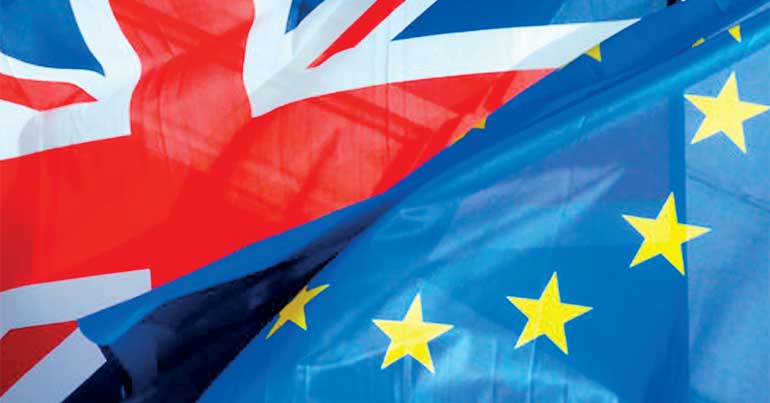Monday Feb 23, 2026
Monday Feb 23, 2026
Tuesday, 5 July 2016 00:02 - - {{hitsCtrl.values.hits}}
Britain’s exit from the EU has been a debate that has been raging for a considerable period of time. The credit for the exit campaign squarely lies with the Independent Party of UK (UKIP) and its versatile leader Nigel Farage. Nigel has been a vociferous critic of the UK’s membership of the EU. Nigel baldy fought for British exit at European Parliament and he was instrumental in creating the public opinion through his eloquent speeches.
Ever since the UK became a member of the EU in 1972, the British political and judicial landscape has had to undergo major reforms as there was a perception that some of the UK standards were in conflict with the EU Charter. The enactment of the Constitution Reform Act of 2005 was one such exercise. UK Human Rights Act of 1988 was introduced to comply with European Convention on Human Rights.
The judgments delivered by the European Court of Human Rights (ECHR) and European Court of Justice (ECJ) have had a direct impact on the British judiciary which had held its independence and reputation for centuries and the British Government had to amend laws to comply with the requirements stipulated by the ECHR and ECJ. All these legislative measures have had a direct bearing on the sovereignty of Britain which eventually became subordinate to EU Charter which is a stark contradiction of the theory of parliamentary supremacy postulated by the British jurist Albert Dicey. These changes were indigestible to some of the Euro sceptics. Opinion was brewing slowly and steadily which culminated on the vote to leave the EU on 23 June. The electoral message was loud and clear. Cameroon lost the campaign to stay with the EU.

The Brookings Institute study says that Brexit and the dissolution of UK is the ‘greatest catastrophe of the 21st century’ and will have unfathomable ramifications in terms of economic, political and global strategic balance. This would also be the birth of new political alignments and power blocks. There is indeed a new political order yet to manifest itself. The immediate question that strikes an analyst is whether there will be other countries that would opt to follow British example.
Since there is an overwhelming opposition to Brexit in Scotland, it would be difficult to prejudge the outcome whether that would lead to the breakup of UK and the UK’s position within NATO alliance. The transfer of nuclear weapons from the hands of Scotland to UK proper and whether Scotland would remain with NATO or as a neutral state are the questions that haunt US administration.
Scotland hosts the Fastlane naval base which is a staging base for Royal Navy nuclear powered submarines. Nevertheless strong political, economic and cultural ties that Scotland shares with US and UK would dictate a new defence alliance with NATO. Scotland would be a tiny economy under a new dispensation hence the US and British naval presence would certainly augment the domestic economy. If yet another country follows British precedent then the EU would altogether be an irrelevant factor in Europe.
The EU is a web of complex regulations and trade is conducted through strict application of EU directives and regulations that govern the trade and commerce between members of the EU and with non-members of the EU. EU competition laws are very strict and the EU Competition Commission decides the mergers and acquisitions and also market regulation of take overs.
The jurisprudence on EU completion laws have been advanced over the years and it extends to several volumes of legal publications. Even the takeovers, merger and acquisitions of trade in other countries would have an impact on the EU and EU Competition  Commission’s sanction is also required in some cases. What would be the position of Brexit on some of the majority shareholding of British companies engaged in business in the EU? There will have to be a re-appraisal of the concept of market share or the market dominance once again. There will be a host of other re-appraisal as a result of Brexit.
Commission’s sanction is also required in some cases. What would be the position of Brexit on some of the majority shareholding of British companies engaged in business in the EU? There will have to be a re-appraisal of the concept of market share or the market dominance once again. There will be a host of other re-appraisal as a result of Brexit.
What would be the position of Russia which had until recently been engaged in sabre rattling over NATO expansion overlooking the Russian sphere of influence? Russian military had taken a very aggressive stance over US military engagements in Europe. For Russia the exit of Britain means a rapid erosion of US influence in the EU decision making process.
There is a perception that EU sanctions imposed on Russia seem to have been influenced apparently over US policy considerations. Russia believes that it would now be easy to negotiate with a weakened EU. There have been a number of CIS countries who have already obtained the EU membership and the psychological impact of the EU’s weakening position vis-à-vis – retaining CIS members with EU – would perhaps drive CIS countries once again towards leaning on Russia.
With huge reserves of oil and gas in Russia and its recent resurgence in economic development and the display of its recent military power the CIS countries would have to re-appraise the unfolding political developments in Europe. However a weakened EU would also create economic woes to all the countries across the globe. If political sanity does not prevail, it would certainly be the worst catastrophe as Brookings Institution has predicted.
As far as global economic power is concerned, the US still retains the economic and political influence and it would be a folly to disregard US influence on other countries. After all for US, it is essential to maintain a stronger military presence in Europe and that would require political and economic support to countries hosting US military presence. There is a strong umbilical cord that binds the US and Europe together over centuries old bonds of cross cultural relations. Since the situation is still unfolding there is a possibility of the birth of yet another political entity of US, Canada and UK on one side cajoling the other to join the new alliance.
There are simmering trade wars between EU, Americas and the Gulf Cooperation Council (GCC) countries especially in the airlines industry. The American and European air carriers are at hammer and tongs with the Gulf carriers such as Emirates Airlines, Qatar Airways and Etihad Airways over government subsidies to gulf carriers. Gulf carriers have sought additional frequencies in order to be able to exploit the ‘Fifth’ freedom of the air.
With Brexit even airlines are also compelled to redo their maths in light of the changing market share. EU regulars too will have to restrict the Non EU airlines and their frequencies to Europe with the apparent distortions in the market share. Brexit has caused a whole gamut of changes that require remedies to begin from the scratch. As far as airline industry is concerned “the biggest source of benefits to UK aviation from EU membership is in the area of traffic rights and the nationality of airlines. Any airline owned and controlled by nationals of EU member states is free to operate anywhere within the EU without restrictions on capacity, frequency or pricing” (Source: Report by www.centreforaviation.com).
The existing air traffic arrangements with EU and the impact of Brexit will certainly have exposed market share and market dominance theory for further scrutiny. There will be renegotiation of trade agreements owing to market distortions.
EU always had a tough time competing and contending with rising Chinese economic influence in the global market. With a weakened EU China would certainly gain because EU would no longer be able to mount a strong battle on world stage.
Michael Shuman of Bloomberg asserts that Brexit has provided China with even more economic and political leverage as China challenges the West’s most valued institutions and ideals from navigation rights to human rights, the importance of defending those rules and values is rising steadily. Shuman says that a united EU could have presented a serious check to China’s growing assertiveness ‘as is demonstrated in South China sea’ (emphasis added). When China decided to create a rival to World Bank, US did prevail on European countries to be cautious but Europeans stumbled over themselves to sign up and undermining any hope of extracting concessions from China’s leaders.
(The writer is a political commentator and a freelance journalist. He holds an LLM in International Commercial Law and a Post Graduate Diploma in Diplomacy.)